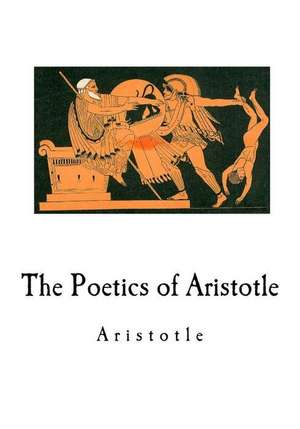The Poetics of Aristotle
Autor Aristotle Traducere de S. H. Butcheren Limba Engleză Paperback
| Toate formatele și edițiile | Preț | Express |
|---|---|---|
| Paperback (8) | 38.61 lei 3-5 săpt. | |
| – | 38.61 lei 3-5 săpt. | |
| CreateSpace Independent Publishing Platform – | 44.13 lei 3-5 săpt. | |
| – | 44.54 lei 3-5 săpt. | |
| CREATESPACE – | 51.93 lei 3-5 săpt. | |
| CREATESPACE – | 51.93 lei 3-5 săpt. | |
| – | 75.30 lei 3-5 săpt. | |
| Martino Fine Books – 24 mai 2011 | 101.44 lei 38-44 zile | |
| University of North Carolina Press – 31 aug 1967 | 190.74 lei 6-8 săpt. |
Preț: 38.61 lei
Nou
Puncte Express: 58
Preț estimativ în valută:
7.39€ • 8.03$ • 6.21£
7.39€ • 8.03$ • 6.21£
Carte disponibilă
Livrare economică 31 martie-14 aprilie
Preluare comenzi: 021 569.72.76
Specificații
ISBN-13: 9781535156851
ISBN-10: 1535156856
Pagini: 32
Dimensiuni: 178 x 254 x 2 mm
Greutate: 0.07 kg
ISBN-10: 1535156856
Pagini: 32
Dimensiuni: 178 x 254 x 2 mm
Greutate: 0.07 kg
Notă biografică
Aristotle was a Greek philosopher and polymath during the Classical period in Ancient Greece. For twenty years he studied at Athens at the Academy of Plato, on whose death in 347 he left, and some time later became tutor to Alexander the Great. On Alexander's succession to the throne of Macedonia in 336, Aristotle returned to Athens and established his school and research institute, the Lyceum. After Alexander's death he was driven out of Athens and fled to Chalcis in Euboea where he died in 322. His writings profoundly affected the whole course of ancient and medieval philosophy.
From his lessons, the West acquired its scholarly vocabulary, just as issues and strategies for request. Accordingly, his way of thinking has applied an exceptional effect on pretty much every type of information in the West and it keeps on being a subject of contemporary philosophical conversation.
Textul de pe ultima copertă
In this work we have Aristotle the critic and analyzer rather than Aristotle the philosopher. the Poetics will be better understood, therefore, and more appropriable if it is read and thought of as the analysis and judgments of a keen mind trying to reduce a mass of Greek poetic material to some intelligible order so that its nature and forms could be better understood.
Descriere
Descriere de la o altă ediție sau format:
The late Preston H. Epps, author of GREEK LITERATURE IN TRANSLATION and THOUGHTS FROM THE GREEKS, analyzes the POETICS of Aristotle, offering penetrating insights into Aristotle as critic and analyzer, rather than philosopher, and describing for readers what Aristotle actually said, rather than what it is thought he meant.
The late Preston H. Epps, author of GREEK LITERATURE IN TRANSLATION and THOUGHTS FROM THE GREEKS, analyzes the POETICS of Aristotle, offering penetrating insights into Aristotle as critic and analyzer, rather than philosopher, and describing for readers what Aristotle actually said, rather than what it is thought he meant.
